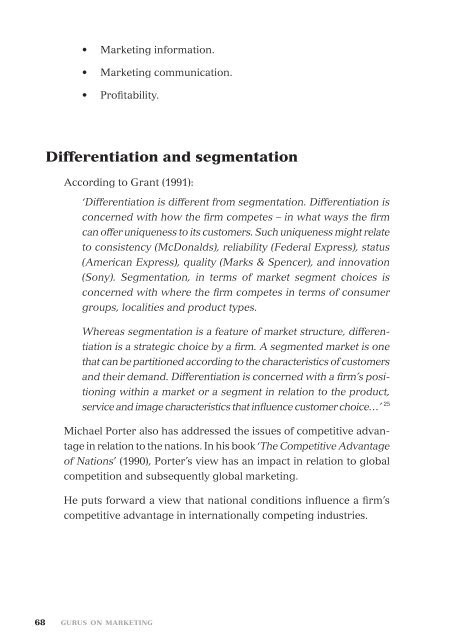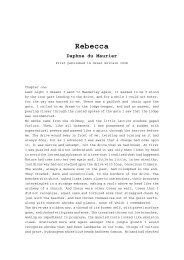Gurus On Marketing
Gurus On Marketing
Gurus On Marketing
You also want an ePaper? Increase the reach of your titles
YUMPU automatically turns print PDFs into web optimized ePapers that Google loves.
• <strong>Marketing</strong> information.<br />
• <strong>Marketing</strong> communication.<br />
• Profitability.<br />
Differentiation and segmentation<br />
According to Grant (1991):<br />
‘Differentiation is different from segmentation. Differentiation is<br />
concerned with how the firm competes – in what ways the firm<br />
can offer uniqueness to its customers. Such uniqueness might relate<br />
to consistency (McDonalds), reliability (Federal Express), status<br />
(American Express), quality (Marks & Spencer), and innovation<br />
(Sony). Segmentation, in terms of market segment choices is<br />
concerned with where the firm competes in terms of consumer<br />
groups, localities and product types.<br />
Whereas segmentation is a feature of market structure, differentiation<br />
is a strategic choice by a firm. A segmented market is one<br />
that can be partitioned according to the characteristics of customers<br />
and their demand. Differentiation is concerned with a firm’s positioning<br />
within a market or a segment in relation to the product,<br />
service and image characteristics that influence customer choice…’ 25<br />
Michael Porter also has addressed the issues of competitive advantage<br />
in relation to the nations. In his book ‘The Competitive Advantage<br />
of Nations’ (1990), Porter’s view has an impact in relation to global<br />
competition and subsequently global marketing.<br />
He puts forward a view that national conditions influence a firm’s<br />
competitive advantage in internationally competing industries.<br />
68<br />
GURUS ON MARKETING










